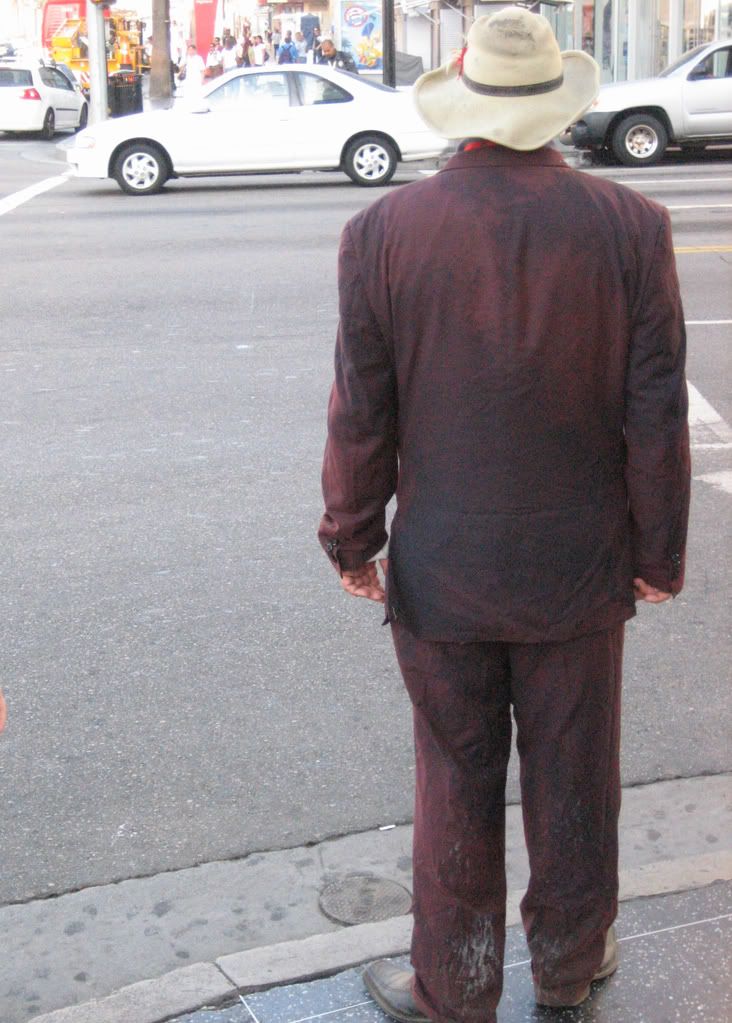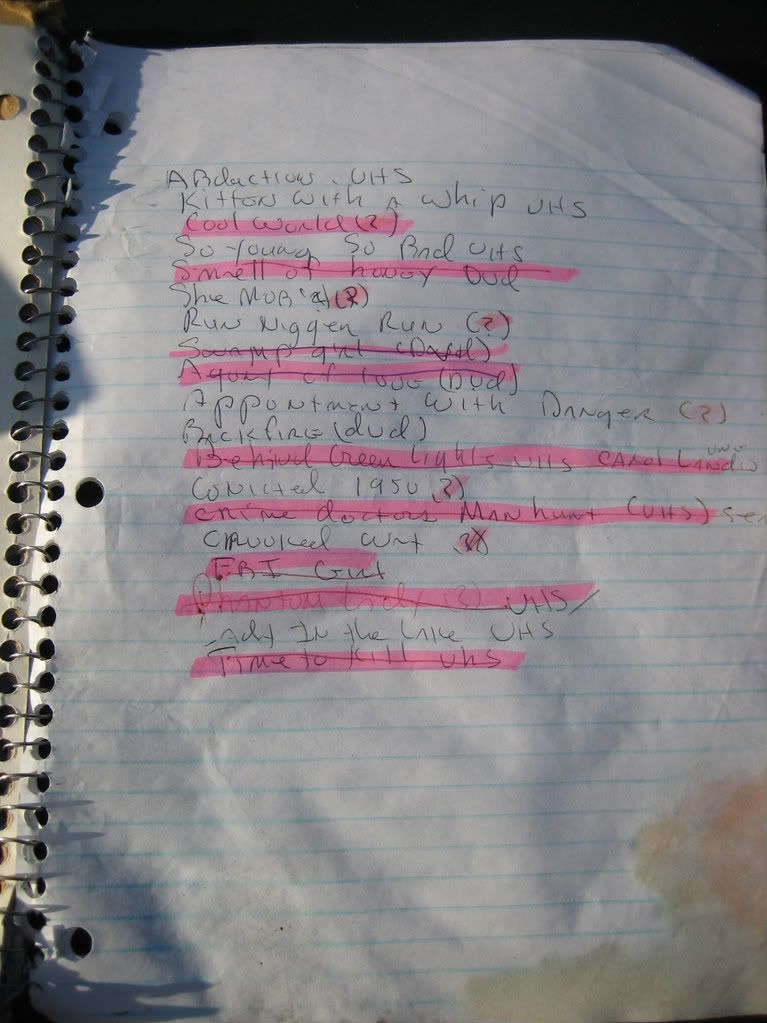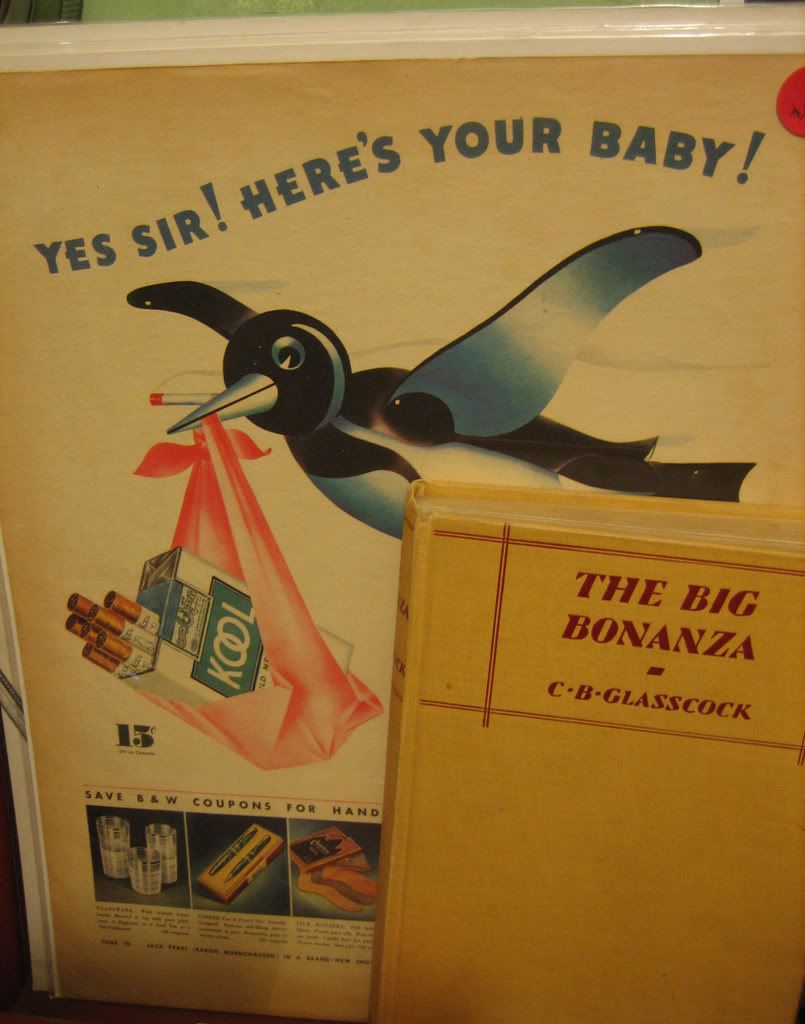Wednesday, April 30, 2008
THE GOOD BOOK by Moby Pomerance
8:00 pm this evening, Circle X Theatre Co. will present a reading of The Good Book, a new play by New Texture's Moby Pomerance.
Location:
STUDIO/STAGE
520 Western Ave
Los Angeles, CA 90004
The event is free to the public, with street parking.
See you there!
Monday, April 28, 2008
Saturday, April 26, 2008
Slash What The Fuck

But the nonprofit group Arf Society, which organizes the event, also sells merchandise complete with the unmistakable logo depicting Zappa's unique facial hair, the moustache-soul patch combo. And that, says Gail Zappa, Frank's widow and head of the Zappa Family Trust, violates the Zappa trademark. She is suing the group for €150,000 ($236,000) in damages and an additional €250,000, should the Zappanale continue selling Zappa merchandise.
Has the Arf Society caused €150,000 in "damages" to anyone? What means this "damage?" How does one party prove that €150,000 has been damaged away from another party through the sale of tee shirts, tote bags and coffee mugs with a logo depicting facial hair? Is that the kind of thing you learn in law school? Sounds fun!
Was Frank Zappa the first person to have that "unique" facial hair? Was he the only person to have that "unique" facial hair?
Her real concern though, she says, is her husband's legacy.
"One of the reasons you file a trademark is to protect the works of a person," Gail Zappa told SPIEGEL ONLINE in a telephone interview. "I felt we were getting into territory where we were putting the audience at risk in terms of who Frank was. You become concerned."
How does one harm music? (Are all my efforts to destroy Mozart's music really in vain?) How does one protect music? Is it "music" that is harmed and protected, or is it an individual's ability to make money off of someone else's labor that is harmed or protected?
How does someone put someone "at risk in terms of who Frank was?" Who is this "we" that is putting the audience at risk "in terms of who Frank was?" Was it the evil tribute bands?
Who became concerned? The "at risk" audience? Was this concern consumer driven or producer driven?
"Help us, we are an audience and we are concerned about being at risk in terms of who Frank was!"
"She is harming Frank Zappa's legacy much more than she is helping it," Dippel says. "I have talked to a number of people who are planning on boycotting all Zappa products in the future."
How does one harm or help a legacy? Can't you only do that with a time machine? The works of Frank Zappa are forever set in zeros and ones for anyone interested in that work. (period.) Zappa's legacy is his work, and his work is easily available to all, and that work is now and forever unchanging.
That people are "unofficially" performing Zappa's music ultimately does nothing to the reality of Frank Zappa's music, some of which has been in shrink wrap for almost 40 years.
Has anyone proven that "unofficial" performances of Frank Zappa's music have caused "damages" (€150,000 or otherwise) to (the now dead) Frank Zappa?
Has anyone proven that "unofficial" performances of Frank Zappa's music have created "competition" for other organizations performing the music of Frank Zappa, "officially" or otherwise?
Yes, yes, the rules say, the rules the rules the rules--but really now, how do you prove those kind of things?
"Would the Zappanale folks be doing this if Frank was still alive? No fucking way," she says. "We licensed performances when he was still alive. But you at least check to make sure they do a good job. I'm sure he would probably do what I am doing."
A good job according to whom? The composer (who is now dead) or someone other than the composer?
What constitutes a "good job?" Is that which constitutes a "good job" a static thing, or can it change?
Does Charles Gayle do a "good job" playing Naima? Does Michael Brecker?
How about this robot--does it do a "good job" at playing Giant Steps? The robot is playing it faster than Coltrane did. Faster is better, no? Should "we" sue the robot just for good measure?
Gail -- who refers to the statue as an "impish creature" that "doesn't look like Frank Zappa unless you argue that putting a moustache on any face looks like Frank Zappa" -- says that very little communication has taken place with the Zappanale. "I've long known that there was this quote-unquote festival slash event slash what the fuck," she says.
But then along comes "quote-unquote festival slash event slash what the fuck"--which is genius. Pure genius--and it is a genius that I, as an artist, shall take and use for my own, in the same way that lesser minds (like me) have done with (to?) greater geniuses since the beginning of expression. So now, when people ask me what kind of music I do (which isn't very often) as of this moment forward I tell them "slash-what-the-fuck" music.There really is a little good in everything.
But she also claims that the organizers have not responded to requests by her lawyers to detail exactly what kind of products they are selling and how great the turnover is. She insists, however, that her primary concern is the music. "My obligation, which I cannot be relieved of by anyone other than Frank Zappa, is to protect the intent and integrity of his music," she says. "That's my job. I have no choice."
Maybe I already asked this, but how does one protect the "intent" let alone the "integrity" of someone else's music that is already released and recorded by the artist himself, who is now dead? (But the shrink wrap--nothing can get through shrink wrap...)
I really am asking. Yes yes, "integrity"--don't let sell D. Boon's song to Volvo, blah blah blah. But "intent?" How does one protect "intent?" How does someone other than the artist who created in the work in question know what the artist's intent was in creating that work in the first place--let alone the intent of someone like Frank Zappa?
(It's all so radionic!)
Was Frank Zappa really so simple that his intent could be understood? Did Frank Zappa understand Frank Zappa's intentions? Did he ever communicate those intentions verbally or in a language other than music? Have Frank Zappa's intentions become more or less clear in the last decade, or have they stayed constant? Again, I am asking from a place of not knowing.
Is it possible to create a work without intent? What if the intent of the artist creating a particular work of art is to document "being in the [passing] moment without intent"--as can sometimes be the case in an "improvisation?" How does one "protect" that intent? Do "improvisations" even deserve "protection?" Are improvisations even music? Are improvisors even musicians?
How is one to gauge the effectiveness of a protection bestowed upon an "intent?" How about the effectiveness of a protection bestowed upon an "integrity?" Is that something an accountant measures, or can that be gauged with one of them thetan readers?
Does it take [personal] integrity to protect the integrity of a body of work?
What does it look like when a body of work's integrity is well protected? Which dead artist's integrity of body of work is well protected? (Is that even a sentence?)
Is the integrity of Richard Wagner's work well protected? Is the integrity of the works of Michael Jackson well protected? How about Phil Spector? Does he count? How about the "intent" of the afore mentioned artists? What can we say about Richard Wagner's intent? What can we say about Michael Jackson's intent? Is the "intent" of their work under siege, or is the "reality" of their person under siege? What if you just like the Jackson 5?
(I know it sounds like I'm being a smart ass, but I'm really trying to make sense of this. While "protecting integrity and intent" all reads very well on the video monitor, I just don't know what it really means. Of course, I am [foolishly and quaintly] operating under the assumption that words have meaning, so all of this is probably a waste of my time and, if you've read this far, definitely a waste of yours.)
If, however, in the event words do mean something--anything--then how is it that Gail Zappa has "no choice" in what she is doing? How is it that "only Frank Zappa" (who is dead) can relieve her of her "Job?"
Is that slavery? Is that legal? Aren't there rules against that? Can't someone be punished? Can't all problems be fixed with money?
Before his death in 1993, Frank Zappa offered his wife many earnest bits of advice. One piece, in particular, was to be applied to the music business that the composer, guitarist and bandleader had worked within and battled against for much of his 30-year career.
”Get out.“
It sounds to me like someone has just been relieved of their "Job"--but only on planet Words-Mean-Something.
Gail Zappa's work as head of the Zappa Family Trust is to preserve perhaps the most vital aspect of her husband's work: artistic intent.
If you could preserve only one, which one would you preserve:1. The aural reality of Zappa's work--you know, the 50 some odd discs he completed himself while alive that you can play in a CD player and purchase on the internet and are preserved in shrinkwrap anyway
or
2. The silent "artistic intent" as codified by someone other than the (now dead) Frank Zappa that cannot be played in your CD player nor realized in any three dimensional way what so ever?
”It's like what they write on the side of the cars of the Los Angeles Police Department: "To Protect and Serve,'“ said Zappa, who will visit Lexington on Friday as the keynote speaker of the American Musicological Society's South-Central Chapter conference. The talk, followed by a concert of his music, is free and open to the public.
What is being protected and who is being served? Is the artist who created the work in the first place but who is now dead enjoying this protection, or is it someone other than the artist who is being protected? Is the artist who created the work in the first place but who is now dead being served, or is someone other than the artist who is being served?Hey everyone, it's Let's Pretend Time:
Let's pretend we put some favorite Zappa albums (CD's, subcutaneous chips, etc) and put them in a lead lined box--a vault if you will--for safe keeping. Let's see...a copy of Crusin' with Reuben and the Jets, Tinsel Town Rebellion, Shut up and Play your Guitar, Civilization Phase Three, Studio Tan...there, that should do it.
Now let's pretend every man woman and child on the face of the earth grew "unique facial hair" and spent the rest of their days playing Frank Zappa's music to the exclusion of all other music and activity; fuck farming, forget medicine, adios to driving the bus, no more pizza delivery, no Coltrane, no Bach, no Dixon, no Lebenden Toten, no Keisha Chante--just Frank Zappa's music 24-7...For the next 300 years.
Finally lets pretend that in 300 years people still know how to operate shovels and CD players. From under a 60 foot pile of fast food wrappers, court documents, crack pipes, robot parts and red white and blue glitter, out comes our lead lined box and in go the CD's and the sub-cutaneous music chips in to the respective players.
Did the music change? Hold on, where did that other set of foot prints go?
What if the answer is no? What if the music stayed the same? What if all those ones and zeros stayed in the same order?
But really now--will there even be music 300 years from now? Will there be a 300 years from now? If there is a 300 years from now, and there is music, who will be make it? Will it sound anything like the music of today? More importantly, will there still be lawyers and "music law?"
$ $ $
”My job is to protect the intent and the integrity of the work. That's the deal,“ she said.
Who's deal? What are the qualifications for the job, or is it a bloodline thing like the US presidency and all the well paying jobs?”Has the government changed?“ Gail Zappa asked in reply. ”People with rules, they never seem to change. They just add more.
How about punishments? Do "people with rules" just add more punishments when they "just add more rules?" What is it about our western addiction to rules and punishment? Rules and punishment, rules and punishment, rules and punishment.Police and thieves.
Good and Evil.
Hate and War.
Laughs and chuckles.
How about people with power? How are they with rules? Any kind of general, rule-of-thumb track record for mixing people with power, rules and punishment?
$ $ $
”I think some people, in an effort to preserve the status of their sort of elitism, have this attitude that has prevailed and prevented anything really imaginative, interesting, wonderful or creative to occur in a concert hall. It's all more of the same."
Isn't "the same" a valuable commodity? Isn't "different" a real liability? Isn't "the same" the thing that drives the economy--you know, repeatability?
And isn't "the same" and "repeatability" and serving the economy and lawyers and litigation and rules and punishment the essence/intent/integrity of Zappa (tm)?
(This could very well be a "trick" question to which I don't know the answer.)
$ $ $
Is it really a "prevailing attitude" that prevents "anything really imaginative, interesting, wonderful or creative to occur in a concert hall" or is it something different...something else...something a little more concrete (and menacing) than an "attitude?"
(Haven't we always been at war with Oceana?)
Zappa plays Zappa is an official presentation of Frank Zappa's music because this performance series is licensed by the Zappa family trust.
This is absolutely true and it says nothing about music, only the presentation of the music, and when I think of presentations of music, I think of Drama students forming bands. Funk bands in particular.
Can music be official? Can the shoe of music really be smeared with the shit of officialdom?
The decision to license is governed by two factors: the performances must be in accordance with, that is, respects the intent of the Composer and the integrity of the works.
Say I wanted to license a work by Frank Zappa. Who chooses and by what criteria does one determine whether or not the "intent" and "integrity" the composer is being "respected?" Not only must someone other than the composer know what the composer's (licensee) intent was, but they must also know the musician's (licensor) intent vis a vis the initial intent in their decision to perform the licensee's music.
(did I get the licensee/licensor thing right?)
Is that criteria "musical" in nature, or is that criteria "extra musical" in nature? Do "musical concerns" trump "extra musical concerns" or is it the other way around?
Doesn't licensing sound fun? Isn't that why we all got into music in the first place...to license it?
Friday, April 25, 2008
Gorilla Marketing
But it won't be all fun and games! We're seizing the opportunity to spread the good word about our endeavors, passing out a very groovy postcard - or, more in keeping with the huckster spirit of the event, a "limited edition collectors card" - in an effort to hip the people to all the good things going on around here that you already know about.
The Tales From the Dead side showcases the film's gorgeous poster art, while the New Texture side features one of my Koreatown photos paired with a brief snippet of prose: a bit of film criticism by William, the bus driver who features prominently in a bunch of my bus stories.
Here's a peek for those of you unable to attend and claim your own. Click the pic to enlarge it for easier reading:

copyright © 2008 Wyatt Doyle
Thursday, April 24, 2008
TALES FROM THE DEAD on Fangoria

Our friend Jason Cuadrado has made it to Fangoria, just in time for his birthday today. Congratulations, Jason!
To read Fango's piece on Jason's movie Tales From the Dead, click the screenshot above.
west pointer
“The strangest thing happened to me today. I went for a walk at lunch, and as I was coming back I got stopped by this guy; he seemed like he might have been homeless. He asked me, ‘Which way is it to
“He shook his head. I told him, ‘Well, that’s how you get to
“‘No!’ He shouts. ‘Which way is it that way?’ And he’s pointing the wrong way!
“Later I thought I should have just agreed with him and said, ‘Okay, go that way and turn, then turn again up the block and keep going…that way.’ You know, turning him around the right way. But all I could think to say at the time was, ‘It’s the other way!’
“He snorted and kept walking, waving me off like I obviously didn’t know what the hell I was talking about.”

copyright © 2008 Wyatt Doyle
Wednesday, April 23, 2008
Tuesday, April 22, 2008
Monday, April 21, 2008
The Amazing Mr. Ballantine
Carl Ballantine, late of The Ed Sullivan Show, McHale’s Navy and at least one episode of every television show ever made, recently made the latest in a long line of special guest appearances, this time at Skylight Books in Los Feliz. The occasion was a book signing to promote Drew Friedman's new collection, More Old Jewish Comedians, which features a fantastic Friedman portrait of Ballantine, among others.
After a Q&A with Friedman, moderator Ben Schwartz asked the crowd if there were any additional questions.
“Yeah,” called Ballantine from his folding chair in the audience. “When is this gonna be over so I can get something to eat?”
copyright © 2008 Wyatt Doyle
Friday, April 18, 2008
Thursday, April 17, 2008
Vanina Marsot's FOREIGN TONGUE
So what's it all about?
Look for it from Harper Collins in April 2009!
Tuesday, April 15, 2008
New story by Wyatt Doyle!
"My Name Is Joe" by Wyatt Doyle
Click on the title to read it, or click the Hydrant of the Free, below.

(URL: http://www.newtexture.com/content/view/336/54/ )
photo copyright © 2008 Wyatt Doyle
Monday, April 14, 2008
Friday, April 11, 2008
Your Majesty, You've Done It Again!
I'm not sentimental, but when that building is erected, it will block all of the natural light to my little first-floor apartment behind the garbage cans that I'm currently struggling to keep up with the modest rent on.
And I don't look forward to looking out my window or stepping outside every day with no choice but to look into the 1,000 square-foot lives of the poor suckers, eyes wide with optimistic hip urban home ownership, who've mortgaged their future to keep up with the cool kids as every month their income stagnates, their Ikea furnishings fade from fashion and their flat-screen goes on the fritz, the poorly riveted steel frame of the building begins to buckle and the half-inch thick caulk joints around the windows begin to peel until they sell it at a loss or rent it out to hard-partying college kids bankrolled by their parents.
That might sound pessimistic, but it isn't unrealistic. This is New York City, after all. It's not like it hasn't happened.
The real-estate guy doesn't waste time on such thoughts.
He doesn’t realize it, but he bears a striking physical resemblance to his paternal grandfather’s great-grandfather, who was personal valet to Ferdinand Bourbon, King of Naples.
His ancestor had made his fortune by stealthily taking a gold coin from atop His Majesty’s dressing table every morning, and through sleight of hand creating the impression that he'd just removed it from the freshly used Royal bedpan declaring, “You’re Majesty, you’ve done it again!” before carrying the steaming tray of Royal crap through the echoing baroque marble hallways and emptying it into the water closet.
Every morning for ten years.
Ferdinand, an appreciator of both flattery and innovative fecal humor, adopted the habit of allowing his faithful manservant to keep the coins as a tip until the summer of 1820 when, as the pressures of the revolt by Pepe and his Carbonari , with his own army mired down in Sicily no less, and his exclusion from the Congress of Troppau led to the erosion of both his fortunes and his sense of humor he responded one morning by growling, “Clean it off and put it back.”
Sensing the end of the party, within months the real-estate guy's ancestor had abandoned his family in the dark of night with a ticket in his pocket for first-class passage to New York, where he changed his name, reaped a bonanza in the stock market and married into High Society.
We'll see if this douchebag manages to cash out in time.
copyright, © 2008 Andy Biscontini
Thursday, April 10, 2008
Vanina Marsot in Vietnam
the Well of Heavenly Clarity, Temple of Literature, Hanoi
copyright, © 2008 Vanina Marsot
Wednesday, April 9, 2008
Eric Braeden in THE MAN WHO CAME BACK
Though Braeden is probably best known to most for his 28 year (and counting!) run as Victor Newman on The Young and the Restless, to me he's Dr. Charles Forbin, hero scientist of the criminally underrated Colossus: The Forbin Project. (Not to mention his role as Bernhardt Stieglitz in "The Werewolf" episode of Kolchak: The Night Stalker.)
For the time it takes to phone in an RSVP, you can attend the screening as a guest of the Institut, and admirers of Mr. Braeden's work and career will be able to meet him there in person.
From the Institut's website:
The Man Who Came Back
Produced and starring Eric Braeden
Saturday, April 12th 2008, 3:00 p.m.
Goethe-Institut Los Angeles, 5750 Wilshire Blvd. Suite 100, Los Angeles, CA 90036
Admission is free
RSVP is required by April 9th at 323.525.3388
 Produced by Eric Braeden, directed by Glen Pitre, starring Eric Braeden, Billy Zane, Armand Assante, George Kennedy
Produced by Eric Braeden, directed by Glen Pitre, starring Eric Braeden, Billy Zane, Armand Assante, George KennedySet in the 1870s in Texas "The man who came back" is a story of murder, conspiracy and one man's revenge.
Written and directed by veteran indie director Glen Pitre, the feature is based on one of the bloodiest labor strikes in the history of the United States.
Eric Braeden took a hiatus in 2007 to portray Reese Paxton in the moody western, shot on location in Conroe and Brackettville, Texas.
Eric not only donned a Stetson but took on the Executive Producer cap as well. Other actors rounding out the cast include Billy Zane, Armand Assante, Carol Alt, Sean Young, Ken Norton and Jennifer O'Dell.
This screening is presented by the German-American Cultural Society
No admission without reservation. Doors open at 2:30pm.
Short notice, I know, but what are you gonna do?
Who? Where?

Allan Holdsworth is playing in the little town where I grew up.
Anyone out there give a shit about Allan Holdsworth? It seems like he's someone you either love or hate. Most of my friends hate his music. They hear that clean, chorus tone and they just bug.
Once upon a time, my friend Rich played in a "country rock" type outfit. The group would perform at the same geographic location where Allan Holdsworth will be performing. As you can imagine, the venue has changed significantly in the last several years.
If I have the story correct, the leader of said "country rock" band gave Rich the specific instruction that he was not to play any of those "Allan Holdsworth faggot chords"--meaning any chords containing an interval of a 7th, 9th, 11th, or 13th.
I sent an e-mail to Rich asking if he was going. The initial response was that he hadn't heard about it. How is it that I, over 3000 miles away heard about it and he, 30 miles away didn't? What the hell is that all about? The second E-mail said he got tickets and he is going to see the performance with a mutual friend who, like Rich and I, knew and played music (albeit in varying degrees and differing capacities) with Jon Van Wie.
I used to take guitar lessons from Jon when I was wee tot. I took those lessons in the same town where I grew up and where Allan Holdsworth will be performing. In so doing, I learned early that Jon was as great a man and as consummate and bitchin' a musician as any who have ever walked this earth. Jon had a superhuman facility with his hands, as well as an equally super human ability to memorize. A wonderful guitar player. A motherfucker of a guitar player. How motherfucking? Memorizing guitar solos by Allan Holdsworth on the record Metal Fatigue. He also had Pat Martino's solo from "Sonny" memorized. As well as the Eddie Van Halen canon. And the Steve Vai canon (up to Eat Em And Smile.) And there he was, teaching guitar in the basement of the music store.
(To give you a sense of context, Jon and Steve Vai were at Berklee at the same time.)
Were that not all enough, Jon went on to be a consummate and bitchin' mouthpiece maker/reface-er. He worked for a lot of people. Taking a census of all his clients would be a sprawling, star studded project.
I have two of his mouthpieces, one of which still works. The other got dropped on a cement floor and broke. I can remember that day as if it happened moments ago. Thankfully when I remember that episode, I no longer crap my pants and start crying as I did for so long. Losing that mouthpiece was like losing Jon all over again. I replaced it with a Berg Larsen. While it's no Jon Van Wie, I am quite pleased with it.
Jon also made me a metal mouthpiece. I tried and I tried and I tried, but I just couldn't do it. For some reason, I can't play metal mouthpieces (any more.) I don't know why--I used to have a Lawton and a Sugal and a Rovner (I think) and they were all metal, and I liked them just fine. But this one was just too much to handle--something about the finish on the brass. It put my teeth on edge and made me feel like I was putting an unfair strain on my liver.
I sent it back to him on the understanding that he would make me a(nother) hard rubber one. He sold that metal mouthpiece to David Liebman. Shortly there after Jon Van Wie passed away.
I wrote David Liebman and asked him if I could purchase the mouthpiece back from him, regardless of price, as said mouthpiece means more to me than it could ever possibly mean to David Liebman, so on and so forth.
His reply was that he was keeping it as a "spare."
And that was the end of that.
+ + +
There is a lot to like about Allan Holdsworth, or there was back in the late 80's and early 90's. I've heard some more recent things of his on the interweb and they certainly still have the same appeal. That appeal (for me) is his sui generis concept of harmony, followed closely by his ability to nimbly realize those concepts. Who doesn't love a lot of notes going by really quickly? What's great about Allan Holdsworth is that for the most part, none of those notes repeat. What's not to like about run-on sentences of notes played from one end of the guitar to the other really quickly?
With Holdsworth, more than any other "fusion" artist I can think of, my sorrow is that he never collaborated with the "free" drummers. Who wouldn't want to hear a trio with Allan Holdsworth, Rashid Bakr and William Parker? How far of a stretch is it from Cecil Taylor to Allan Holdsworth? Yes, yes, quite a distance, I know--but they're closer than most. Closer than Axel Rose and Cecil Taylor, for one. Regardless, I'd go out of my way to check Allan Holdsworth with Rashid Bakr and William Parker out. Wouldn't you?
That's not to say he's surrounded himself with losers. For a while there he was playing with Chad Wackerman. Is that who he's touring with now?
From Frank Zappa to Allan Holdsworth. What must it be like to be Chad Wackerman? Even if you don't give a shit about Frank Zappa or Allan Holdsworth you have to admit, Chad Wackerman has had some unique experiences in music. If "unique" means anything anymore, the Holdsworth/Wackerman axis certainly seems auspicious on paper--though I cannot lay claim to having ever actually really listened to any of their collaborative work for actual-real.
(Pass the pulitzer.)
Nevertheless, the story is as much about the little town where I grew up, as it is about Allan Holdsworth. I think the last gig as atomic as this one was when Bush I flew in to "Vets field" for a rally. I remember seeing a spattering of Marines "securing the perimeter". That was pretty creepy. I also remember many of the girls at school were really really excited!!! That was totally creepy.
Then, the town was a 98% Republican community. Now I would imagine that number is somewhere near 99.993%. Then again, now that it doesn't matter, his (Bush II's) popularity could have slipped somewhere around 96.66% Because really, who doesn't like to kick someone when they're down?
Do Republicans like Allan Holdsworth? Is that the Allan Holdsworth demographic--republicans living in suburban New Jersey?
Does anything make sense anymore?
copyright © 2008 Stanley Jason Zappa
Sunday, April 6, 2008
"Picture Pages, Picture Pages"










copyright © 2008 Stanley Jason Zappa
Friday, April 4, 2008
Who dosed Mike Gravel?
"I won't be voting for him for president, but his campaign video is a step above the other yahoos."









